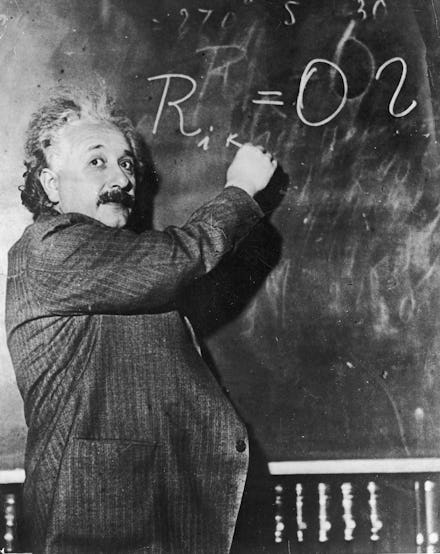If Einstein's Theory Is True, Scientists Could Unlock New Parts of the Universe

The science community is collectively losing its mind over an announcement that's allegedly hours away.
After possibly spotting two black holes colliding, the folks at Louisiana's Laser Interferometer Gravitational-Wave Observatory may have successfully detected gravitational waves — elusive fluctuations in the fabric of space and time that theoretically occur when a massive object, like a black hole, moves.
These waves were predicted by physicist and coiffure king Albert Einstein a century ago as part of his theory of general relativity. Einstein theorized that the waves would make space-time bend under the weight of the object's waves. It would also give scientists a better understanding of how black holes actually operate.
Remember that scene in Interstellar where Matthew McConaughey goes through the black hole, right before the movie gets highly theoretical and weird? Researchers might figure out what the inside of that black hole actually does.
The story is rumored to be released in the science publication Nature on Thursday. In January, theoretical physicist Lawrence Krauss tweeted that he'd received independent confirmation that the rumors are true. "Stay tuned!" he wrote. "Gravitational waves may have been discovered!!"
How the waves were allegedly spotted: Wherever you are right now, you're receiving gravitational waves — they're just extremely hard to detect. This is because by the time they reach you, they've lost a lot of the force they had during the time it took to get from their source (like black holes colliding or neutron stars scooting around the universe) to Earth.
To measure them, you need extremely powerful detectors: lasers that can measure changes in space-time as precise as one one-thousandth of the diameter of a proton.
What the alleged discovery means: According to NASA Gravitational Astrophysics Lab chief Tuck Stebbins, speaking to AFP, if LIGO was successful in detecting the gravitational waves, we could see "back to the first one trillionth of a second of the Big Bang."
So, to recap, we might have proved an aspect of Einstein's hundred-year-old theory true. Not only that, but we might be able to glimpse the very beginnings of the universe.
This breakthrough is so big — literally — that Clifford Burgess, a theoretical physicist at McMaster University in Canada (who penned the leaked email above), bets the discovery will win the Nobel Prize in physics this year.
It gets even better, if you want to get all cosmic about this: Black holes are often found at the centers of galaxies. So if scientists can reliably and frequently detect the movement or presence of black holes, they could possibly detect galaxies we didn't even know existed, like ones hiding behind our own interstellar radio waves.
How we detect objects and activity in the universe has changed tremendously. As astronomer Catherine Nary Man told AFP, we used to use only ultraviolet or visible light to view the universe. Now we listen to the noises produced by the gravitation of celestial bodies as they interact with the fabric of space-time.
This new potential discovery is the pinnacle of what new technology can accomplish in our mission to understand what's over our heads.
Or to put it in Burgess' words to AFP, "It's off-the-scale huge."